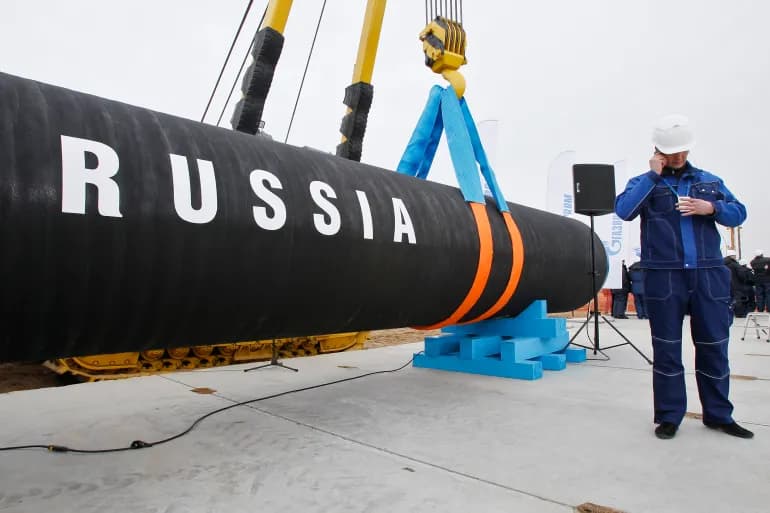We're loading the full news article for you. This includes the article content, images, author information, and related articles.
A Ukrainian ex-officer accused of sabotaging the Russia-Germany gas pipelines now faces charges in Berlin, a case with significant geopolitical implications for European energy security and the war in Ukraine.

ROME, ITALY – Italy's highest court, the Supreme Court of Cassation, has finalized its ruling to extradite a Ukrainian man to Germany, where he is a key suspect in the 2022 sabotage of the Nord Stream gas pipelines. The decision, confirmed on Wednesday, November 19, 2025, concludes a months-long legal battle and transfers former Ukrainian military officer Serhiy Kuznetsov into German custody to face charges of anti-constitutional sabotage and causing a deliberate explosion. He is expected to be handed over to German authorities within days.
The case revolves around the series of underwater explosions on September 26, 2022, that ruptured three of the four pipelines comprising Nord Stream 1 and Nord Stream 2 in the Baltic Sea. The pipelines, designed to transport natural gas from Russia to Germany, were not operational at the time but contained pressurized gas, leading to a massive methane leak. The incident, widely considered an act of deliberate sabotage, occurred near the Danish island of Bornholm and has been the subject of intense international investigation and speculation.
German federal prosecutors allege that Kuznetsov, 49, coordinated and led a six-person team that chartered a yacht, the 'Andromeda', from Rostock, Germany, to plant high-grade explosives on the pipelines. According to extradition documents, investigators believe the team placed at least four bombs at a depth of 70 to 80 meters. While German authorities have not publicly detailed all their evidence, joint media investigations have reported that investigators have identified all suspects, alleging they are Ukrainian nationals.
Kuznetsov was arrested on August 21, 2025, on a European Arrest Warrant while vacationing with his family at a campsite near Rimini, Italy. He has consistently denied any involvement, maintaining that he was serving as an army captain in Ukraine at the time of the explosions. His lawyer, Nicola Canestrini, stated that his client "feels like a scapegoat" and expressed disappointment that the Ukrainian government has not publicly corroborated his whereabouts or defended him. Ukraine's Ministry of Foreign Affairs has stated it is providing consular support and is prepared to cooperate with the investigation, while also demanding Kuznetsov's return to Ukraine.
The extradition carries significant weight, potentially straining relations between Ukraine and Germany, one of its most crucial European military and financial backers in the ongoing war with Russia. The sabotage of the pipelines, which were majority-owned by Russia's state-controlled Gazprom, marked a pivotal moment in Europe's energy crisis, accelerating the continent's decoupling from Russian fossil fuels. Before the invasion of Ukraine, the EU imported about 45% of its natural gas from Russia.
While the immediate impact on gas supply was limited as the pipelines were already shut down, the explosions sent shockwaves through global energy markets and heightened concerns over the security of critical undersea infrastructure. For Kenya and East Africa, the subsequent volatility in global energy prices contributed to inflationary pressures and higher costs for imported fuel and goods. The disruption underscored the interconnectedness of global energy security and its direct economic consequences for nations far from the epicentre of the conflict.
The legal proceedings have been complex. An Italian appeals court initially approved the extradition, but the Supreme Court overturned this in October, citing procedural issues, before the Bologna Court of Appeal reaffirmed the decision, leading to the final Supreme Court ruling. Meanwhile, Poland has refused to extradite another Ukrainian suspect in the same case, Volodymyr Z., with a judge arguing that the act could be seen as legitimate self-defence against Russia's invasion.
As Kuznetsov prepares for trial in Germany, the case remains a focal point of international intrigue. Russia has accused the US and its allies of orchestrating the blasts, a claim Washington vehemently denies. With investigations by Sweden and Denmark now closed, the German probe is the last active inquiry into one of the most significant acts of infrastructure sabotage in modern history.
Keep the conversation in one place—threads here stay linked to the story and in the forums.
Sign in to start a discussion
Start a conversation about this story and keep it linked here.
Other hot threads
E-sports and Gaming Community in Kenya
Active 9 months ago
The Role of Technology in Modern Agriculture (AgriTech)
Active 9 months ago
Popular Recreational Activities Across Counties
Active 9 months ago
Investing in Youth Sports Development Programs
Active 9 months ago